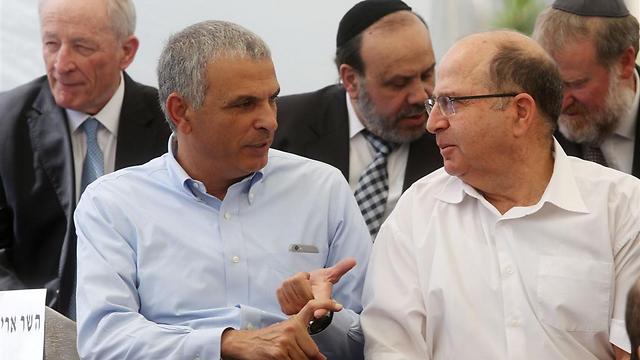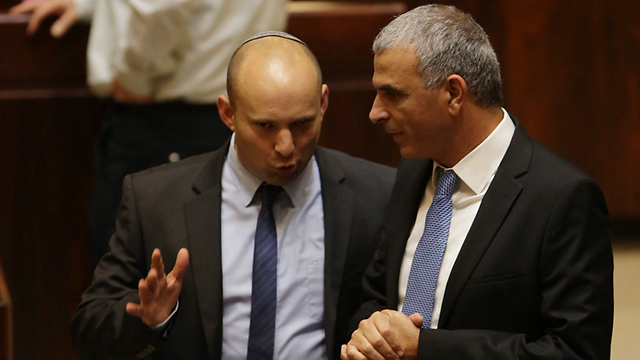Finance Ministry completes work on 2015-2016 state budget, but fight over defense budget, promised coalition money to Kulanu, Bayit Yehudi still ongoing.
The Finance Ministry completed work on the 2015-2016 state budget, which includes cuts to promised “coalition funds” from NIS 8 billion a year to NIS 4.6 billion, and steps to increase the state’s revenues in NIS 2.3 billion in 2016.
The budget also includes across-the-board cuts of NIS 3 billion from government ministries, and an additional cut of NIS 400 million from several government programs.
The Treasury is also initiating a move that would help save NIS 400 million in government spending by increasing allowances for civil servants’ budgetary pensions from 2 percent to 5-7 percent of their salaries.

Battle for the defense budget
Two main issues have yet to be determined, however, primarilythe size of the defense budget. The Finance Ministry based the 2015-2016 budget on the assumption the defense budget will amount to NIS 55.3 billion in 2016, compared to NIS 57 billion in 2015.
The Defense Ministry, meanwhile, is demanding NIS 62 billion for 2015, while the Locker Committee recommended the budget to be capped at NIS 59 billion.

The Finance Ministry is willing to set the defense budget at NIS 59 billion, and find places to cut elsewhere in the budget to make up for the gap, but conditions that on the implementation of all of the Locker Committee’s recommendations, including canceling early pension for some of the military’s personnel.
The Defense Ministry, meanwhile, received special approval from Prime Minister Benjamin Netanyahu to use the budget promised to it in former finance minister Yair Lapid’s 2015 state budget that was never approved. Other government ministries, however, will not receive the same treatment.
The Defense Ministry was supposed to get NIS 57 billion in 2015, but since the budget was not approved in the Knesset, the ministry was supposed to instead get 1/12 of its 2014 budget (NIS 54.5 billion) every month in the interim period until the new budget is approved.
Finance Ministry officials told reporters on Sunday that the Defense Ministry will spend NIS 57 billion in 2015, after reaching an understanding with the prime minister that due to the way the defense budget is managed, the ministry cannot postpone plans based on the additions to the budget it was promised.
Cutting back on promised coalition funds
Another issue still being discussed is the funds promised to the different coalition parties as part of the agreements they signed with the Likud party when they joined the coalition. These are funds originating in a state budget surplus and directed towards purposes chosen by a party in the coalition.
In the recent scandal centering on former Yisrael Beytenu MK Faina Kirschenbaum, suspicions arose that these funds were used by political officials to transfer sums that essentially functioned as part of a system of bribery.
In March, Attorney-General Yehuda Weinstein issued clear instructions for the implementation of political agreements that include budgetary allocations. According to Weinstein, the funds allocated in any such agreement must be included in the state budget and cannot be listed in a way that earmarks them as “belonging” to a party or a faction.
The Treasury reached an agreement with Haredi parties Shas and United Torah Judaism to convert some of the coalition funds promised to them for an increase in child benefits to a monthly savings stipend for every child, which will be accessible at the age of 18. This will reduce the cost of coalition agreements with the Haredi parties in NIS 1 billion in 2015 and in NIS 1.7 billion in 2016.

The remainder of the cuts to coalition funds, some NIS 1.7 billion in 2016, will come from reducing 40 percent of the sums promised to Bayit Yehudi and Kulanu. How exactly that will be done is still being discussed between the faction leaders and the finance minister, but it was already decided to allocate only NIS 800 million in 2016 to raise the salary of conscript IDF soldiers, instead of the NIS 1.3 billion agreed upon in coalition agreements. In addition, unemployment benefits for self-employed, part of Kulanu’s coalition deal, will be budgeted at NIS 210 million, instead of NIS 350 million.
The budget is also based on the assumption that the promise made to Shas to cancel VAT on staple foods will not be implemented, but the issue has not been finalized and is still in talks between the Finance Ministry’s director-general and his counterpart at the Economy Ministry.
In total, the 2015-2016 state budget includes NIS 1.4 billion in cuts and tax hikes in 2015, and NIS 10 billion in 2016. These steps were taken to bridge the gap between the maximum budget allowed by law, and the government’s commitments, which significantly increased following the coalition agreements it signed.
Increasing state revenues
The law allows for an increase of NIS 9 billion in government spending in 2015, and another NIS 9 billion increase in 2016. However, the cost of the coalition agreements (NIS 4 billion in 2015 and NIS 8 billion in 2016), alongside additional commitments made by the government in previous years, have led to the overall spending surpassing the allowed increase.
Among the steps taken to increase state revenues are: Restricting tax exemption on pension allowances to people earning up to three times the average wage (compared to four times now), which is expected to increase government revenues by NIS 300 million; collecting royalties from the Israeli Airports Authority, which is expected to increase revenues by about NIS 500 million; implementating the recommendations of the second Sheshinski Committee, which is expected to raise revenue by about NIS 500 million; and withdrawing dividends from state companies, expected to put NIS 500 million more in Israel’s coffers. In addition, the Finance Ministry is planning on passing a series of laws that will help the Tax Authority in its fight against tax evasion.
In addition, NIS 1 billion in revenues from the sale of state land will be transferred to the government’s budget from KKL-JNF every year.
On the other hand, the budget includes a number of significant additions. Child benefits will increase by NIS 2.5 billion annually; income support benefits for the elderly will increase in NIS 580 million a year; the government will, for the first time, invest NIS 210 million in unemployment benefits for self-employed and increase wages of conscripts, which will cost NIS 800 million a year. In addition, the state will invest an additional NIS 280 million in the construction of public housing.
The expected state revenues will not be sufficient to meet the deficit target, which currently stands at 2.5 percent for 2015 and 2 percent for 2016. To bridge this gap, the Treasury raised the deficit target to 2.9 percent each year and decided on a series of tax hikes that will bring NIS 2.3 billion into the state coffers.
As reported by Ynetnews
